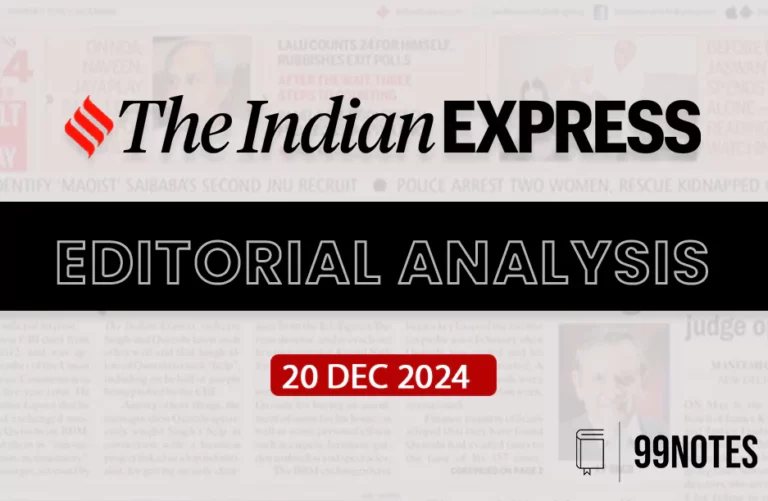30 August 2024 : The Hindu Editorial Analysis
1. Moving the spotlight to grassroots democracy
(Source – The Hindu, International Edition – Page No. – 8)
| Topic: GS2 – Indian Polity – Constitutional Bodies |
| Context |
|
Systemic Disempowerment of State Election Commissions (SECs)
- The Election Commission of India (ECI) is renowned for conducting free, fair, and timely elections.
- However, State Election Commissions (SECs), responsible for elections to panchayats and urban local governments (ULGs), face significant challenges and disempowerment.
Constitutional Mandate
- Articles 243K and 243ZA of the Constitution, introduced by the 73rd and 74th Amendments in 1993, established SECs with authority over electoral rolls and elections for panchayats and ULGs.
- Despite this, SECs often face systemic disempowerment and litigation with state governments.
Recent Legal Disputes
- Karnataka SEC Case: The Karnataka SEC filed a contempt petition against the Government of Karnataka for delaying the delimitation of panchayat raj institutions and elections. The government had previously assured the High Court of timely publication of delimitation details.
- Andhra Pradesh SEC Case: The Supreme Court struck down an ordinance from Andhra Pradesh that obstructed panchayat raj elections, highlighting ongoing conflicts between SECs and state governments.
Performance Audits
- Analysis by the Comptroller and Auditor General (CAG) revealed that 70% of urban local governments lacked elected councils at the time of the audit.
- The CAG’s Karnataka report linked delays in elections to the disempowerment of SECs, affecting the effectiveness and public trust in local governments.
Empowerment of SECs
- Current Status: Janaagraha’s Annual Survey of India’s City Systems (ASICS), 2023, indicates that only 11 out of 34 States and Union Territories have empowered SECs for ward delimitation. These regions represent only 35% of India’s population.
- Reforms Needed: To enhance the effectiveness of local governments and ensure timely elections, significant reforms are required.
Recommended Electoral Reforms
Constitution and Appointment
- Independence: SECs should be on par with the ECI in terms of transparency and independence. A proposed reform is to establish a three-member SEC appointed by a committee consisting of the Chief Minister, Leader of Opposition in the Legislative Assembly, and the Chief Justice of the High Court.
- Amendment: The Union government should amend the 74th Constitutional (Amendment) Act to reflect these changes.
Delimitation and Reservation
- Fixed Intervals: Delimitation of ward boundaries and seat reservations should be mandated at fixed intervals, such as every 10 years, to prevent arbitrary delays by state governments.
- Authority: SECs should be granted the authority to manage ward delimitation and reservations for local government positions.
Election of Local Government Officials
- Reservations and Elections: SECs should also be responsible for reservations and elections to the positions of mayors/presidents, deputy mayors/vice-presidents, and standing committees.
- Delays in these elections often occur due to state governments not publishing reservation rosters on time.
Malpractices and Integrity
- Oversight: SECs should oversee the elections of mayors, presidents, chairpersons, and standing committees to prevent malpractices by state government-appointed presiding officers, as seen in the 2024 Chandigarh Municipal Corporation Council election.
Conclusion
- For effective grassroots democracy and timely local elections, SECs need to be fully empowered, comparable to the ECI.
- Implementing these reforms will help address systemic issues and enhance the credibility and functionality of local governments in India.
| PYQ: To enhance the quality of democracy in India the Election Commission of India has proposed electoral reforms in 2016. What are the suggested reforms and how far are they significant to make democracy successful? (250 words/15m) (UPSC CSE (M) GS-2 2017) |
| Practice Question: Discuss the challenges faced by State Election Commissions (SECs) in conducting timely local body elections in India. Suggest reforms to enhance their effectiveness and autonomy. (250 Words /15 marks) |
2. Biotechnology initiatives need long-term capital investments
| Topic: GS3 – Science and Technology |
(Source – The Hindu, International Edition – Page No. – 4)
| Context |
|
Overview of BioE3 Proposal
- India has a dedicated department for biotechnology since 1986, contributing significantly to vaccine development, diagnostics, and biologicals, earning India a reputation as a ‘vaccine factory’.
- Despite this, biotechnology has not achieved the same industrial impact as the IT sector.
Objectives of BioE3
- Expanding Beyond Vaccines: The BioE3 policy seeks to address the broader potential of biotechnology beyond vaccines, aiming to develop high-value industries involving microbes, gene-modification technologies, bio-plastics, bio-materials, and advanced medical devices.
- Reducing Import Dependence: A key goal is to reduce reliance on imports for ingredients and devices, thereby improving India’s international competitiveness in biotechnology.
Key Verticals of BioE3
- Bio-Based Chemicals and Enzymes: Development of chemical and enzyme products from biological sources.
- Functional Foods and Smart Proteins: Innovations in food products and proteins with enhanced functionality.
- Precision Biotherapeutics: Advanced therapeutic solutions with high precision.
- Climate-Resilient Agriculture: Agricultural practices that are resilient to climate change.
- Carbon Capture: Technologies aimed at capturing and reducing carbon emissions.
- Futuristic Marine and Space Research: Exploration of biotechnology applications in marine and space environments.
Challenges and Recommendations
- Need for Long-Term Investment: The success of the BioE3 policy requires long-term capital investment and supportive infrastructure, addressing chronic manufacturing issues beyond biotechnology.
- Collaborative Effort: The policy must be a collaborative effort between the Centre and States. Quick returns should not be expected; sustained financial and infrastructural support is crucial for long-term success.
Conclusion
- The BioE3 proposal aims to enhance India’s biotechnology sector by focusing on diverse applications and reducing import dependence.
- But the policy requires a strategic, long-term approach to investment and collaboration to overcome existing manufacturing challenges.
| PYQ: How can biotechnology improve the living standards of farmers? (250 words/15m) (UPSC CSE (M) GS-3 2019) |
| Practice Question: Analyse the objectives of the BioE3 policy and discuss how it aims to reduce India’s reliance on biotechnology imports. What are the key challenges to its successful implementation? (150 Words /10 marks) |




